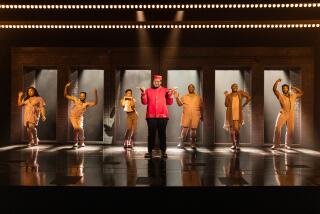He’s Tuned-In to the Audience : Composer Hamlisch Invents Songs on Spot
- Share via
SAN DIEGO — Composer Marvin Hamlisch’s early successes piled up at a prodigious rate. Literary critics would have dismissed as patently incredible a fictional character who had been showered with Academy Awards, Grammy Awards, not to mention a Tony and a Pulitzer Prize, by his early 30s.
The 1970s muse that sparked Hamlisch’s award-winning scores to the musical “A Chorus Line” and to the motion pictures “The Way We Were” and “The Sting” has not been replaced with a 1980s inspiration of equal potency. Although “A Chorus Line” still reigns as Broadway’s longest-running musical, the composer has not come up with subsequent stage
hits that might challenge the legacy of a Richard Rodgers.
So, although his compositional muse remains elusive, Hamlisch dons his hat as the entertainer. Tonight and Saturday, the 44-year-old pianist will appear with the San Diego Symphony in a pair of pops concerts at Symphony Hall.
Reached last week in Los Angeles, where he was preparing the music for the Academy Awards program, Hamlisch said he does about 35 symphony appearances a year. Besides his piano solos in orchestral arrangements of his own tunes, he improvises pieces on themes submitted by members of the audience. Members of the audience call out titles or subjects, and he weaves these ideas into an extended improvisation.
“I think that any concert should be more than what you’ve already done, more than what you can hear on records,” he said. “Making up songs on the spot is something I used to do in my apartment. Somebody would come in and ask, ‘What kind of a day has it been?’ and I’d sing that back as a song.”
Hamlisch acknowledged that having to improvise in front of a large audience keeps him on his toes.
“Otherwise, I would get a little stale just playing my pieces over and over,” he said.
Audience suggestions for song titles tend to be topical with a decided political bent.
“During the Iran-Contra hearings, I got a lot of Oliver North titles. Now the theme of a kinder, gentler nation keeps coming up a lot.”
He claims that his musical imagination has never been stumped by a suggested title.
These improvisatory gems that emerge under the spotlight do not become fodder for later compositions, however.
“No, I forget the music in the next moment,” Hamlisch said.
Although he was a bit of a prodigy--gifted with perfect pitch, he started playing piano at age 5 and was admitted to Juilliard at 7--Hamlisch remains modest about his keyboard abilities.
“As a student, I knew I was never going to become the great American pianist. I was no Horowitz,” he said. “But my father was adamant that I needed to learn to play piano because it’s the best way to show off your own compositions. I play well enough, although I’m not about to play the Khachaturian Piano Concerto.”
Does the composer of “Sunshine, Lollipops and Rainbows,” “The Way We Were” and the theme music for the “Good Morning, America” TV show have a yen to compose what some would describe as “serious” music?
“Now it’s possible,” he said. “I feel a ballet in me. I don’t know that I have the answer to the ‘Rhapsody in Blue’ or a great opera in me, but I’d like one last big hit show that I could be proud of.”
“They’re Playing Our Song,” Hamlisch’s 1979 musical that followed on the heels of “A Chorus Line,” was a small-scaled work that had a respectable Broadway run and was popular in England, but it did not approach the latter’s universal appeal.
Hamlisch became philosophical when asked whether he is alarmed at the invasion of Broadway by British musicals and productions.
“I’ve never thought that the musical has to be only American just because it started here. The world is getting smaller every day. Right now, they know how to do it because their musicals are pre-sold in America. ‘Phantom’ had a $17-million advance sale in this country.”
Hamlisch did express some outrage at the high cost of attending musical theater.
“My feeling is that maybe this will show American producers what is wrong with the musical,” he said. “Any show that costs $55 a ticket is obscene. I remember when I could stand in the back row for $3 to see a show. I think today’s prices are wrong. The musical has become a luxury for the rich--like a diamond bracelet. I note there are no youngsters in the audience now. That’s the problem.”
More to Read
The biggest entertainment stories
Get our big stories about Hollywood, film, television, music, arts, culture and more right in your inbox as soon as they publish.
You may occasionally receive promotional content from the Los Angeles Times.










